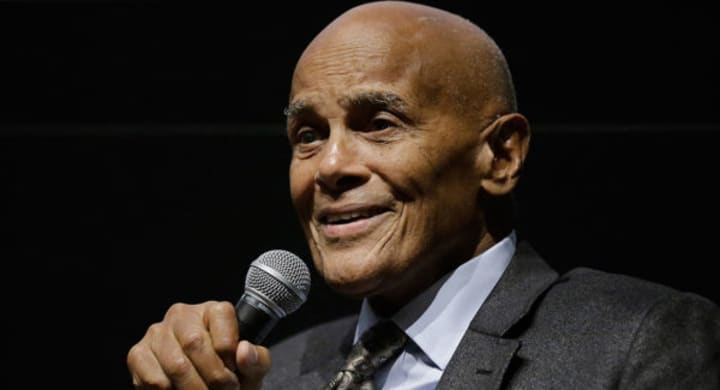
Of 20th century civil rights activists Harry Belafonte is one of the most passionate messengers. Belafonte was widely praised in the 1950s as the King of Calypso—he is remembered as a friend of Martin Luther King Junior and for his historical involvement in anti-poverty activism which preceded the 60s summer of love by a decade. Born in Harlem, New York City, Belafonte's upstanding character, intricate prose, and indomitable dedication to peaceful resolution stands to challenge racist presuppositions about men of colour living in the city.
Speaking as an Irish Canadian with part Chinese-Jamaican ethnicity, I was introduced to Harry Belafonte by my grandfather Len Lyn who was born in China, raised in Jamaica, married in the UK, and lived his remaining 50 years in Toronto. As I was growing up in Toronto, my grandfather introduced me to important and influential music that informed my interest in activism.

Belafonte Speaking Against Poverty and Racism
Belafonte's life represented many parallels with my grandfather's life, which I heard about first hand—stories of Chinese WWII veterans being pelted with rotten vegetables as their divisions were transported on paddy-wagons through New York City, or my mother being forcefully removed from residences when her mixed ethnicity was revealed to other families. With an awareness of this history being brought to my attention at a young age, Belafonte's music and activism represented a positive and peaceful role model for individuals struggling with questions of racial identity.
With the civil rights movement still in living memory, Harry Belafonte challenged societal norms simply by living what most of us in America would consider a normal life. Growing up in Harlem, his elegant prose challenges stereotypical conceptions of urban black men, and private aspects of his life such as his interracial marriage have been brought into public attention by small yet vocal and sometimes violent minorities.
Although the civil rights movement ended forced segregation, interracial marriages have remained controversial in the following decades. Mixed race marriages have existed in America for 100 years and counting. Belafonte's life shows that we have brushed this reality under the rug until very recently when misogynistic and jealous American men have begun to act out.

Belafonte in His Youth, When His Music Was Beginning to Draw Public Attention
Interracial marriages remain a controversial issue in the United States of America and in Canada, and America's history of racism continues to affect our relationships living in mixed ethnicity communities. As time progresses, we will be forced to acknowledge the deep-rooted problems which racism brings between otherwise potentially loving and fruitful interracial connections.
Bob Marley was a Jamaican star, but Harry Belafonte is Jamaican culture. Belafonte created beautiful and engaging dance music, with a distinct element of “highlife” which is entirely his own. Although American conceptions of Jamaican culture are dominated by images of luxury resorts and marijuana smoke, Belafonte presents a stark contrast to this toxic image, representing instead Jamaica's vibrant social culture and pristine natural scenery.
Belafonte's music represents what Jamaican culture means to Jamaicans. Many of his most popular songs come from his album Jamaica Farewell—you may recognize titles such as "Island in the Sun," "Angelina," "Coconut Woman," "Day-O," or "Island in the Sun." In one of his most beloved songs, and my grandfather's favorite song, he sings, “Oh Island in the Sun, hailed to me by my father's hand; all my days I will sing in praise of your forests, waters, your shining sun.” Jamaican culture ought to be about nothing other than this, but stereotypical and divisive images in American media have obliterated this image and have, at best, reduced it to an afterthought.

Belafonte Speaking on Activism
Although I am proud to deliver the message of Belafonte's activism, I ran into difficulties in my high-school experience—steadfast in my declaration that Jamaican culture is not about smoking, I was obviously considered a bit of a buzzkill. As someone proudly representing real Jamaicans, I watched helplessly as my peers appropriated Jamaican culture, and ignorantly promoted negative music to my fellow Canadian-Born Jamaican descendants, many of whom have still never heard of Belafonte.
Although he is still alive to contribute his voice when we speak of 20th-century civil rights activists, Harry Belafonte is undoubtedly the most underrepresented. Despite the growing progressive vote, Belafonte's online content rarely breaks five figure view counts unless paired with a better recognized public figure. His message is consumed by a niche audience of true anti-poverty and peace activists and ignored by hashtag activists who possess the loudest voices, with the least patience for dry but historical civil rights activists.
Popularized in the movie Beetlejuice, "Day-O" represents the exhaustion of laborers working through the night for little compensation.
While Belafonte is still with us, it is of the utmost importance that we appreciate his immeasurable contribution to worldwide peace efforts and anti-poverty movements. Belafonte's message is the very positivity that we claim to be lacking, but in fact, it seems to be modern-day activists who remain ignorant of one of the most important figures of the 20th century. Harry Belafonte remains a meaningful and positive role model for Jamaicans representing their heritage in the United States, and he is certainly one of the lesser known artists and activists we ought to recognize.
About the Creator
Niall LM
Student, Culture Enthusiast, Beatmaker and all-around Creative Individual






Comments
There are no comments for this story
Be the first to respond and start the conversation.